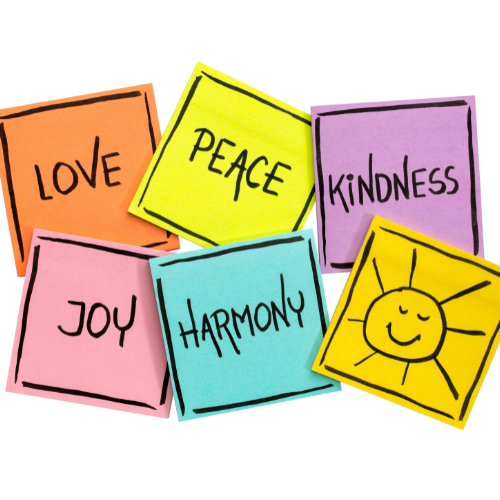The Importance Of A Positive Mind
Jul 27th 2024
Cultivating Gratitude: A Deep Dive into the Transformative Power of Appreciation
On a personal note: I have written many blogs in my life, some great, some well let's just say not so great.
Though I have to say from personal experience, my better blogs are when I am in a positive frame of mind, and
I am not letting the little annoyance of life get me feeling depressed. I recently talked to a customer who was very depressed and frankly not doing well at all, and after telling her my experiences with being grateful for what I have, she seemed to be much better. I believe the one thing I expressed to her made the most difference. I read this saying many years ago, and I honestly can't remember where, but the saying goes like this:
If you are depressed you are living in the past. The past is gone and it can not be changed.
If you are anxious you are living in the future. Trying to live in the " What If" thought process, is not going to work, as No one controls the future.
How to live life to be meaningful is to live in the PRESENT. Make the most of every day and enjoy it to the fullest.
Sit Back And Enjoy The Read!

In the chaotic tapestry of modern life, where demands and challenges abound, it's all too easy to lose sight of the profound impact that gratitude can have on our mental and emotional well-being. Gratitude is not just a fleeting emotion or a mere expression of politeness; rather, it is a transformative mindset that, when cultivated intentionally, has the potential to reshape our outlook on life. This comprehensive exploration will delve into the multifaceted dimensions of gratitude, spanning its psychological underpinnings, its physiological effects on the brain and body, and its role as a powerful tool in overcoming life's inevitable annoyances. Through a detailed analysis of research findings, expert insights, and practical applications, we aim to illuminate the path toward a richer, more positive existence through the practice of gratitude.
The Psychological Landscape of Gratitude
The Neuroscience of Gratitude
At the core of gratitude's influence lies its profound impact on the brain. Neuroscientific studies have consistently shown that expressing gratitude activates brain regions associated with reward, empathy, and emotional processing. The release of neurotransmitters, such as dopamine and serotonin, accompanies feelings of gratitude, contributing to an enhanced sense of well-being.
Dr. Robert Emmons, a leading researcher in the field of positive psychology, conducted groundbreaking studies revealing that individuals who engaged in regular gratitude exercises reported heightened levels of happiness and overall life satisfaction. These exercises ranged from keeping gratitude journals to expressing appreciation to others. Through brain imaging, researchers observed increased activity in the prefrontal cortex—the area associated with decision-making and emotional regulation—highlighting the neurological basis of gratitude's positive effects.
Gratitude as a Coping Mechanism
Life's annoyances, whether minor inconveniences or major challenges, can accumulate and cast a shadow over our mental landscape. Gratitude serves as a powerful coping mechanism, enabling individuals to redirect their focus from the negative to the positive. When faced with adversity, the intentional practice of gratitude allows individuals to find meaning, purpose, and even hidden opportunities within challenging situations.
A comprehensive review of studies conducted by psychologists Dr. Michael McCullough and Dr. Robert Emmons highlighted the role of gratitude in promoting psychological resilience. By reframing adversity through a lens of appreciation, individuals develop a mental flexibility that facilitates adaptive coping strategies. This resilience, rooted in gratitude, becomes a foundational element in navigating life's twists and turns.
Gratitude's Impact on Mental Health
The connection between gratitude and mental health is a well-established field of study. Research consistently demonstrates that individuals who regularly engage in gratitude practices experience lower levels of stress, anxiety, and depression. Gratitude acts as a natural antidote to negative emotions, creating a buffer against the psychological toll of life's daily challenges.
Dr. Martin Seligman, known for his work in positive psychology, emphasizes the role of gratitude in enhancing overall mental well-being. His research indicates that individuals who focus on their strengths and express gratitude for positive aspects of their lives demonstrate a significant increase in life satisfaction. The cultivation of gratitude emerges as a proactive strategy for fostering mental resilience and fortitude.
The Physiological Symphony: Gratitude's Impact on the Body
Stress Reduction and Immune System Enhancement
The mind-body connection is a powerful and intricate dance, and gratitude plays a harmonious role in orchestrating this intricate symphony. The physiological benefits of gratitude extend beyond the realm of psychology, influencing the body at a cellular level.
Chronic stress, a pervasive aspect of modern life, can wreak havoc on both mental and physical health. Research conducted by Dr. Lisa Aspinwall and Dr. Richard Tedeschi suggests that gratitude may serve as a protective factor against the negative health effects of stress. Grateful individuals exhibit lower cortisol levels, reduced heart rates, and improved autonomic nervous system functioning—a trifecta of indicators that contribute to overall well-being.
Moreover, studies exploring the intersection of gratitude and the immune system reveal fascinating connections. Dr. Wendy Berry Mendes, a professor of psychiatry, conducted experiments demonstrating that individuals who expressed gratitude experienced significant increases in immune system function. Gratitude, it seems, has the power not only to soothe the mind but also to fortify the body's defenses.
Sleep Quality and Gratitude

In the quest for a healthier and more balanced life, the importance of quality sleep cannot be overstated. Gratitude emerges as a surprising ally in the pursuit of restful nights and rejuvenating slumber.
Research led by Dr. Nancy Digdon at MacEwan University explored the relationship between gratitude and sleep quality. The findings revealed that individuals who practiced gratitude reported better sleep duration, less difficulty falling asleep, and increased feelings of overall well-being. The act of expressing gratitude before bedtime created a positive mental environment conducive to relaxation, underscoring the holistic impact of gratitude on well-rounded health. This experience truly opened my eyes in the most wonderful way. Now, it doesn’t matter who it is—I joyfully express my gratitude for their help, kindness, bright smiles, or even their silly knock-knock jokes. I now sleep much better, and the best part is seeing people’s smiles and hearing their giggles. It’s simply heartwarming!
Gratitude Practices: From Theory to Action
The Gratitude Journal
One of the most accessible and widely studied gratitude practices is the gratitude journal. This simple yet profound exercise involves regularly recording things for which one is thankful. Whether it's a beautiful sunset, a kind gesture from a colleague, or a moment of personal achievement, the act of documenting these positive experiences fosters an intentional focus on gratitude.
Dr. Sonja Lyubomirsky, a professor of psychology, conducted a seminal study on the impact of gratitude journaling. Participants who engaged in this practice reported increased levels of happiness and life satisfaction compared to those who did not. The regular reflection on positive experiences instills a habit of mind that actively seeks and appreciates the good in daily life.
Expressing Gratitude to Others
Beyond personal reflection, the act of expressing gratitude to others has far-reaching effects on both the giver and the recipient. Dr. Sara Algoe, a social psychologist, explored the dynamics of interpersonal gratitude and its influence on relationship quality.
In her research, participants who openly expressed gratitude to their partners experienced increased relationship satisfaction and a deeper emotional connection. Gratitude, when communicated authentically, strengthens social bonds, fostering a positive atmosphere that extends beyond individual well-being to the broader community.
Random Acts of Kindness

Gratitude extends its reach into the realm of altruism through the practice of random acts of kindness. Dr. Sonja Lyubomirsky and Dr. Kristin Layous conducted experiments demonstrating that individuals who engaged in intentional acts of kindness experienced elevated levels of happiness.
Whether it's helping a neighbor, offering a kind word to a stranger, or volunteering time for a charitable cause, these acts become conduits for gratitude. The positive ripple effect generated by such gestures not only enhances individual well-being but contributes to the creation of a more compassionate and interconnected society.
Gratitude's Role in Overcoming Life's Annoyances
Reframing Perspectives
Life's annoyances, from minor inconveniences to major setbacks, are an inevitable part of the human experience. Gratitude, however, equips individuals with a powerful tool for reframing perspectives and finding silver linings within the clouds of frustration.
In the face of a traffic jam, for instance, a grateful mindset transforms the situation from a source of annoyance to an opportunity for mindfulness or enjoyment of an audiobook or podcast. Spilled coffee becomes a chance to appreciate the aroma and warmth of a fresh cup, embracing the positive amid the perceived negative.
Research - Findings - Conclusions:
Now I know there are loads of research studies stated in this article, but here is the bottom line. It has no impact on you what everyone states. As each of us are individual personality. What is good for one person may not be good for the other. But hear (read) me out. Just try it. If it doesn't work, well then it doesn't work, but I truly believe that you will find a huge difference in your life. It may be the small things at first, things you may not even acknowledge. Maybe finding the parking space right by the store you want to shop at, instead of parking 3 blocks away. It may be your boss understanding how hard you have worked and gives you a raise, it may be a person who you don't know and says you have a great smile. Small things yes, but I have no doubt you will feel a positive emotion surge through your body.

The Gratitude Challenge
Incorporating gratitude into everyday life is a transformative practice that can significantly enhance your overall well-being. Cultivating gratitude is not about grand gestures; it's about appreciating the small, positive aspects of your life consistently. Here are practical and achievable ways to infuse gratitude into your daily routine:
- Gratitude Journaling:
- Set aside a few minutes each day to jot down three things you are grateful for. These can be as simple as a beautiful sunset, a kind gesture from a friend, or a moment of personal achievement.
- Be specific and reflect on why you are grateful for each item. This deepens your connection to the positive experiences you're acknowledging.
- Morning Reflections:
- Start your day on a positive note by reflecting on something you are grateful for. It could be the opportunity to begin a new day, the warmth of your bed, or the aroma of your morning coffee.
- Incorporate this reflection into your morning routine to set a positive tone for the day ahead.
- Express Gratitude to Others:
- Make it a habit to express gratitude to those around you. This can be through verbal affirmations, handwritten notes, or small gestures of appreciation.
- Acknowledge and thank people for their kindness, support, or positive impact on your life.
- Mindful Moments:
- Integrate mindfulness into your day by taking a moment to appreciate your surroundings. Whether you're in nature, at work, or at home, pause and notice the positive aspects.
- Engage your senses and be present in the moment, savoring the details that often go unnoticed.
- Gratitude Jar:
- Create a gratitude jar and place it in a prominent spot in your home. Whenever something positive happens or you feel grateful, write it on a slip of paper and put it in the jar.
- Periodically revisit the contents of the jar to relive moments of gratitude and reflect on the positive aspects of your life.
- Gratitude Walks:
- Take a walk, either in nature or around your neighborhood, with the intention of focusing on gratitude. Use this time to reflect on the beauty around you and the positive aspects of your life.
- Engage all your senses during the walk, appreciating the sights, sounds, and smells that contribute to your well-being.
- Gratitude Challenges:
- Set weekly or monthly gratitude challenges for yourself. The challenge may include finding something new to be grateful for each day or focusing on a specific theme, such as relationships or personal achievements.
- Share your challenges with friends or family to create a sense of accountability and mutual encouragement.
- Gratitude Rituals at Mealtime:
- Before each meal, take a moment to express gratitude for the food you're about to enjoy. Reflect on the effort that went into its preparation and the nourishment it provides.
- Consider sharing this practice with family or friends during communal meals.
- Evening Reflections:
- Before bedtime, reflect on the positive aspects of your day. Identify moments that brought you joy, gratitude, or a sense of accomplishment.
- Use this reflection as an opportunity to cultivate a positive mindset before sleep.
- Digital Detox with Gratitude:
- Designate specific times during the day to disconnect from digital devices. Use this time to focus on gratitude without distractions.
- Engage in activities that promote gratitude, such as reading a gratitude-focused book or practicing meditation.
Remember, the key to incorporating gratitude into everyday life is consistency and mindfulness. By consciously acknowledging and appreciating the positive aspects of your life, you gradually reshape your mindset and foster a greater sense of contentment and joy.
PS. Need some joy in your life? Visit this enchanting Etsy page, where my friend showcases a treasure trove of delightful graphics! Designs are perfect for mugs and t-shirts to special events and birthday parties, these charming designs are crafted to bring smiles and spread positivity. Dive into a world of creativity and inspiration—it's truly worth exploring!
These are designs to make you smile.

